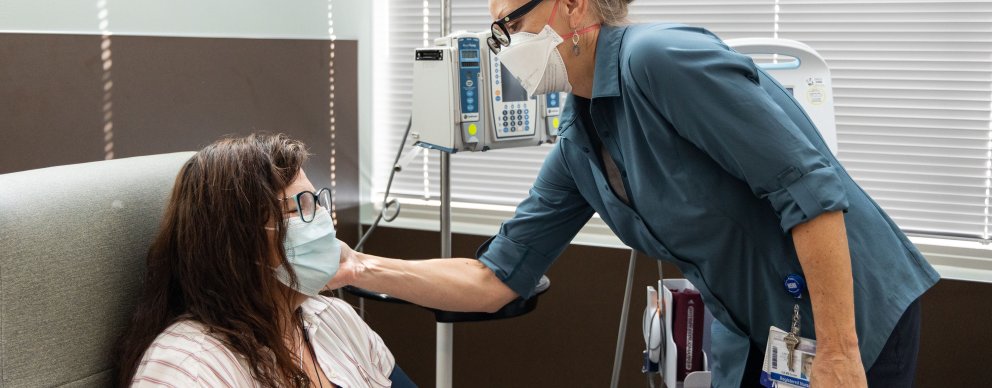Neurology
Learn more about UW Medicine’s Neurology program and the expertise of our neurologists.
Neurology
Learn more about UW Medicine’s Neurology program and the expertise of our neurologists.

Neurology at UW Medicine
The UW Medicine Neurosciences Institute is home to one of the largest and most experienced groups of neurologists in the Pacific Northwest. Our team includes subspecialists with fellowship training in headache medicine, epilepsy (epileptologists), movement disorders, multiple sclerosis and more.
Our team of neurologists are dedicated to meeting the healthcare needs of patients with neurological conditions. Our specialists provide personalized consultation, evaluation and treatment. Each patient’s symptoms and health history are carefully evaluated to provide an accurate diagnosis. Sub-specialists are available for the full range of neurological issues such as epilepsy, stroke, movement disorders, memory disorders and dementia, multiple sclerosis, neuromuscular diseases, sleep disorders, and pediatric neurology.
What is a neurologist?
Neurologists are medical doctors who care for the brain and spinal cord (central nervous system). They also care for the network of nerves that branch out from your spinal cord and run through the rest of your body (peripheral nervous system).
If an illness or injury affects any part of your nervous system, you may experience pain, numbness, weakness, tremors, balance problems or memory problems. These are often referred to as “neurological symptoms.”
If you have new or troubling neurological symptoms, your primary care provider (PCP) may refer you to a neurologist. Due to their many years of specialized training, neurologists have a deep understanding of the nervous system. They’re uniquely qualified to confirm whether your symptoms are caused by a neurological disorder – and coordinate treatments that will help you feel better.
Almost 100 neurologists near you
What conditions do neurologists treat?
Neurologists diagnose and help treat many sudden and chronic conditions. These include:
Headache including migraines
-
Memory disorders such as Alzheimer’s disease and dementia
-
Movement disorders, including Parkinson’s disease
-
Neuromuscular disorders such as amyotrophic lateral sclerosis (ALS)
Some neurologists, known as general neurologists, care for a wide range of neurological problems. Others pursue advanced training in specific neurological conditions. These neurologists are considered “subspecialists.” They offer a level of experience that’s hard to find.
At the UW Medicine Neurosciences Institute, we have neurologists who subspecialize in many of the conditions listed above.
What to expect from your neurologist
Whether you were referred to a neurologist by your PCP or you’re seeking a second opinion, your care will start with a thorough evaluation. This may include:
- A medical history to discuss any recent injuries or previous conditions that may be causing your symptoms
- A physical exam to check motor and sensory skills, balance and coordination, reflexes, mental status and nerve function
Diagnostic services for neurological disorders
Your neurologist will order one or more tests to help rule out certain conditions and pinpoint the source of your symptoms.
Some tests uncover signs of damage, such as lesions in the brain or spinal cord, or loss of brain cells. Other tests confirm whether certain nerves work properly, or if there are abnormal electrical signals in the brain. Still other procedures can detect tumors and blocked or burst blood vessels in the brain.
Having an accurate diagnosis is key to making sure you receive the most effective treatments, tailored to you.
Team-based care
Once you have a diagnosis, you can continue relying on your neurologist for ongoing care or routine follow-up visits. They will oversee your treatment plan and provide certain types of medical care, such as managing your medications or monitoring implanted devices.
Your neurologist can also refer you to (or work with) any other specialists who should be involved in your care, such as:
- Neurosurgeons (brain and spine surgeons)
- Neuro-oncologists (doctors who specialize in brain and spine cancer)
- Rehabilitation specialists (physical, occupational and speech therapists)
- Neuropsychiatrists (providers who specialize in treating mental or behavioral challenges caused by certain neurological disorders)
This approach helps ensure you receive the complete care and support you need to recover – or live well with your condition.
Leaders in neurology, research and training
In addition to providing outstanding care, our neurologists are also involved in medical education and research.
The UW School of Medicine ranks No. 2 in the nation in federal research funding. This allows us to conduct clinical and scientific research related to new neurological discoveries and safer, more effective treatments. As our patient, you can enroll in clinical trials that let you try promising new therapies before they’re widely available.
Because we’re affiliated with a university and medical school, we’re also teaching and training the next generation of top neuroscience specialists.